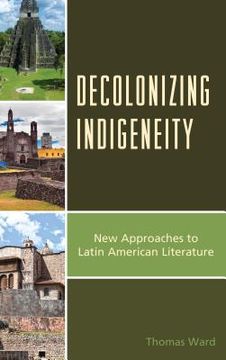Compartir
Decolonizing Indigeneity: New Approaches to Latin American Literature (en Inglés)
Thomas Ward
(Autor)
·
Lexington Books
· Tapa Dura
Decolonizing Indigeneity: New Approaches to Latin American Literature (en Inglés) - Ward, Thomas
$ 241.710
$ 335.710
Ahorras: $ 94.000
Elige la lista en la que quieres agregar tu producto o crea una nueva lista
✓ Producto agregado correctamente a la lista de deseos.
Ir a Mis Listas
Origen: Estados Unidos
(Costos de importación incluídos en el precio)
Se enviará desde nuestra bodega entre el
Martes 16 de Julio y el
Martes 23 de Julio.
Lo recibirás en cualquier lugar de Chile entre 1 y 3 días hábiles luego del envío.
Reseña del libro "Decolonizing Indigeneity: New Approaches to Latin American Literature (en Inglés)"
While there are differences between cultures in different places and times, colonial representations of indigenous peoples generally suggest they are not capable of literature nor are they worthy of being represented as nations. Colonial representations of indigenous people continue on into the independence era and can still be detected in our time. The thesis of this book is that there are various ways to decolonize the representation of Amerindian peoples. Each chapter has its own decolonial thesis which it then resolves. Chapter 1 proves that there is coloniality in contemporary scholarship and argues that word choices can be improved to decolonize the way we describe the first Americans. Chapter 2 argues that literature in Latin American begins before 1492 and shows the long arc of Mayan expression, taking the Popol Wuj as a case study. Chapter 3 demonstrates how colonialist discourse is reinforced by a dualist rhetorical ploy of ignorance and arrogance in a Renaissance historical chronicle, Agustin de Zárate's Historia del descubrimiento y conquista del Perú. Chapter 4 shows how by inverting the Renaissance dualist configuration of civilization and barbarian, the Nahua (Aztecs) who were formerly considered barbarian can be "civilized" within Spanish norms. This is done by modeling the categories of civilization discussed at length by the Friar Bartolomé de las Casas as a template that can serve to evaluate Nahua civil society as encapsulated by the historiography of Fernando de Alva Ixtlilxochitl, a possibility that would have been available to Spaniards during that time. Chapter 5 maintains that the colonialities of the pre-Independence era survive, but that Criollo-indigenous dialogue is capable of excavating their roots to extirpate them. By comparing the discussions of the hacienda system by the Peruvian essayist Manuel González Prada and by the Mayan-Quiché eye-witness to history Rigoberta Menchú, this books shows that there is common ground between their viewpoints despite the different genres in which their work appears and despite the different countries and the eight decades that separated them, suggesting a universality to the problem of the hacienda which can be dissected. This book models five different decolonizing methods to extricate from the continuities of coloniality both indigenous writing and the representation of indigenous peoples by learned elites.
- 0% (0)
- 0% (0)
- 0% (0)
- 0% (0)
- 0% (0)
Todos los libros de nuestro catálogo son Originales.
El libro está escrito en Inglés.
La encuadernación de esta edición es Tapa Dura.
✓ Producto agregado correctamente al carro, Ir a Pagar.

